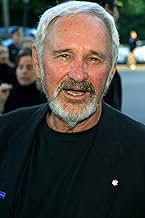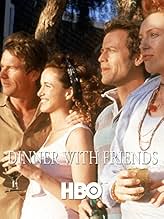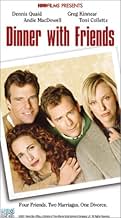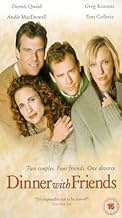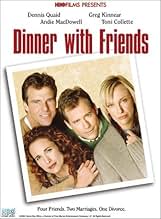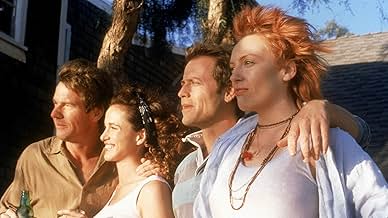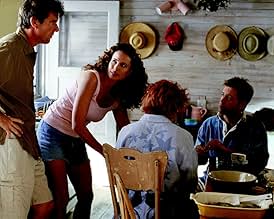IMDb RATING
6.2/10
3.6K
YOUR RATING
Two married couples have their twelve-year bond of friendship put to the test when one couple reveals that they are splitting up.Two married couples have their twelve-year bond of friendship put to the test when one couple reveals that they are splitting up.Two married couples have their twelve-year bond of friendship put to the test when one couple reveals that they are splitting up.
- Nominated for 2 Primetime Emmys
- 1 win & 6 nominations total
Greg Bronson
- Upscale Dinner Guest
- (uncredited)
Caroline Neville
- Nancy
- (uncredited)
Featured reviews
Two couples, upper middle class and no financial problems: four friends. They marry at about the same time, each have two kids, they spend a lot of time together, *best* friends... And then, one of them split up.
The movie, by the way of dialogs, shows how each of the four's world is shaken up, as their unspoken contract, namely, to raise their kids together, to grow old together, is broken. Questions: Whose fault is the breakup, husband's or wife's? Which couple has it right: those, who stick to marriage or those who break out of the rut? Who has the right to judge: those who keep to their marriage vows, or those who acknowledge that their relationship has been a lie? Can we demand that our friends always tell us the truth? How do we react when our closest friends question the unspoken foundations of our lives? The movie follows the actions and reactions of our characters in this situation. Nobody is right, nobody is wrong. In a way, everybody is right. That is what makes the movie interesting. The men act the way men act, and the women act the way women act. The questions are not really answered, they are debated, and the movie shows that completely grown-up people are really unable to answer them.
I liked the performances of the actors. Andie McDowell was as beautiful as she always is. I also liked the two guys. The environment, the camera, etc. seemed just right. But the most interesting were the dialogs. So, if you like movies in which people investigate themselves, their lives, and their relationships, without giving you a definite answer what to do, you may enjoy this movie.
The movie, by the way of dialogs, shows how each of the four's world is shaken up, as their unspoken contract, namely, to raise their kids together, to grow old together, is broken. Questions: Whose fault is the breakup, husband's or wife's? Which couple has it right: those, who stick to marriage or those who break out of the rut? Who has the right to judge: those who keep to their marriage vows, or those who acknowledge that their relationship has been a lie? Can we demand that our friends always tell us the truth? How do we react when our closest friends question the unspoken foundations of our lives? The movie follows the actions and reactions of our characters in this situation. Nobody is right, nobody is wrong. In a way, everybody is right. That is what makes the movie interesting. The men act the way men act, and the women act the way women act. The questions are not really answered, they are debated, and the movie shows that completely grown-up people are really unable to answer them.
I liked the performances of the actors. Andie McDowell was as beautiful as she always is. I also liked the two guys. The environment, the camera, etc. seemed just right. But the most interesting were the dialogs. So, if you like movies in which people investigate themselves, their lives, and their relationships, without giving you a definite answer what to do, you may enjoy this movie.
Having seen Donald Margulies' play when it opened in New York, I was interested in what Norman Jewison, the director, had done with it for the screen version. It helps that Mr. Margulies did his own adaptation, although, it appears to this viewer, the stage version was more satisfying. Not that there's anything wrong with the film, it's just that the cast in the play was far superior than these well intentioned actors we see in the movie. Mr. Margulies has tried to open his play, but it just doesn't go anywhere.
The basic premise, and a caveat to good friends, is to stay away from "fixing up" prospective marriage partners, as things in life are a bit more complicated than a good ending in a book, a play, a movie, or human relations.
Karen and Gabe are happily married. They conjure to arrange a meeting with Beth, a painter, and Tom, a lawyer. Basically, the idea of having mutual friends meet one another, might not be bad, but in reality things should be let alone and let nature takes its course. The bright idea back fires on Karen, who, upon hearing at the beginning of the film that her best friend, Beth, is divorcing Tom, is visibly upset. She feels betrayed by these two people she was instrumental in bringing together.
It's hard for both, Gabe and Karen, to think where they went wrong in their match making roles. They never take into consideration that Beth is totally wrong for Tom, and vice versa. The problem is that this couple don't think that Beth and Tom have found new partners in what appears to be a much solid relationships than what they had together. Karen and Gabe are crushed, but in reality, not everything is perfect in their own marriage. We get hints that yes, they are not completely happy, but they have decided to stay in the marriage out of decency and out of duty to their two boys, which is what Beth and Tom have failed to do. Call them old fashioned, but one has to give Karen and Gabe a lot of credit for at least trying to stay together as a family.
Andie MacDowell is Karen; she is a beautiful woman. In the movie, Ms. MacDowell appears a bit distant. She loved to bring people together and resents their friends separation. Ms. MacDowell's Karen comes across as a hard and judgmental person. Dennis Quaid tries hard to give Gabe warmth. Perhaps he comes across as the best of the four principals. Toni Collette's Beth is an enigma until her confrontation with Karen at the restaurant, then, we see a woman that is not shy in telling her best friend off as she embarks in a new relationship. Greg Kinnear is Tom. He is perhaps the weakest link in the quartet, as he is perhaps, not treated fairly by Karen, or Gabe.
The movie remains a bit theatrical, but Norman Jewison has done wonders with the material.
The basic premise, and a caveat to good friends, is to stay away from "fixing up" prospective marriage partners, as things in life are a bit more complicated than a good ending in a book, a play, a movie, or human relations.
Karen and Gabe are happily married. They conjure to arrange a meeting with Beth, a painter, and Tom, a lawyer. Basically, the idea of having mutual friends meet one another, might not be bad, but in reality things should be let alone and let nature takes its course. The bright idea back fires on Karen, who, upon hearing at the beginning of the film that her best friend, Beth, is divorcing Tom, is visibly upset. She feels betrayed by these two people she was instrumental in bringing together.
It's hard for both, Gabe and Karen, to think where they went wrong in their match making roles. They never take into consideration that Beth is totally wrong for Tom, and vice versa. The problem is that this couple don't think that Beth and Tom have found new partners in what appears to be a much solid relationships than what they had together. Karen and Gabe are crushed, but in reality, not everything is perfect in their own marriage. We get hints that yes, they are not completely happy, but they have decided to stay in the marriage out of decency and out of duty to their two boys, which is what Beth and Tom have failed to do. Call them old fashioned, but one has to give Karen and Gabe a lot of credit for at least trying to stay together as a family.
Andie MacDowell is Karen; she is a beautiful woman. In the movie, Ms. MacDowell appears a bit distant. She loved to bring people together and resents their friends separation. Ms. MacDowell's Karen comes across as a hard and judgmental person. Dennis Quaid tries hard to give Gabe warmth. Perhaps he comes across as the best of the four principals. Toni Collette's Beth is an enigma until her confrontation with Karen at the restaurant, then, we see a woman that is not shy in telling her best friend off as she embarks in a new relationship. Greg Kinnear is Tom. He is perhaps the weakest link in the quartet, as he is perhaps, not treated fairly by Karen, or Gabe.
The movie remains a bit theatrical, but Norman Jewison has done wonders with the material.
Gabe (Dennis Quaid) and Karen (Andie MacDowell) are a married couple with kids. They are regaling their friend Beth (Toni Collette) with food stories from their trip to Italy. Beth shocks them by revealing that Tom (Greg Kinnear) had cheated on her and wants a divorce. It forces Gabe and Karen to reconsider their longtime friends.
Norman Jewison has adapted a play. This starts great with interesting actors. I hope for better but that's not in the cards. It's a relationship movie where I'm not sure that I care about the relationships. It is still fascinating at first but over time, I lost interest. It feels too much like a play.
Norman Jewison has adapted a play. This starts great with interesting actors. I hope for better but that's not in the cards. It's a relationship movie where I'm not sure that I care about the relationships. It is still fascinating at first but over time, I lost interest. It feels too much like a play.
No character makes sense, everybody is wrong. Gabe and especially the ultra conservative Karen constantly temper in their friend's decisions, which are really none of their business (as if my best friend had a right to tell me who I should be with or what my goals and principles in life should be). Tom on the other hand is a self-righteous bastard who always thinks of himself as the victim. He loves talking about himself and doesn't accept anyone else's opinion. And Beth, well, she's just an unbelievably annoying person. I could see how anyone would want to leave her.
A movie about failed marriages and love should show how nobody is wrong and everybody is right. The thing is, none of the four characters here is believable and the dialog is painful at times. From the first time Tom and Beth meet it's hard to believe that the two of them are even attracted to each other. It's also hard to believe that somebody as far removed from reality as Karen is living on this planet and happily married.
Nope, the writers got it all wrong and not even the cast can save this movie. Sorry.
A movie about failed marriages and love should show how nobody is wrong and everybody is right. The thing is, none of the four characters here is believable and the dialog is painful at times. From the first time Tom and Beth meet it's hard to believe that the two of them are even attracted to each other. It's also hard to believe that somebody as far removed from reality as Karen is living on this planet and happily married.
Nope, the writers got it all wrong and not even the cast can save this movie. Sorry.
The opening scene of this film is very good, with equal parts humor, pathos, agony and sympathy. Problem is, it gets progressively worse as it goes along, and in the end, it just ... ends. It's as if the script writer(s) indiscriminately decided that it was a good place to write "The End" and say the hell with it.
Did you know
- TriviaThe play "Dinner with Friends" won the Pulitzer Prize in Drama in 2000.
- GoofsFifteen minutes into the movie, just before Gabe says "Beth, I'm sorry," the clock in the kitchen reads 8:50. A few seconds later, the clock in the foyer reads 8:20.
Details
- Runtime
- 1h 34m(94 min)
- Color
- Sound mix
- Aspect ratio
- 1.85 : 1
Contribute to this page
Suggest an edit or add missing content


